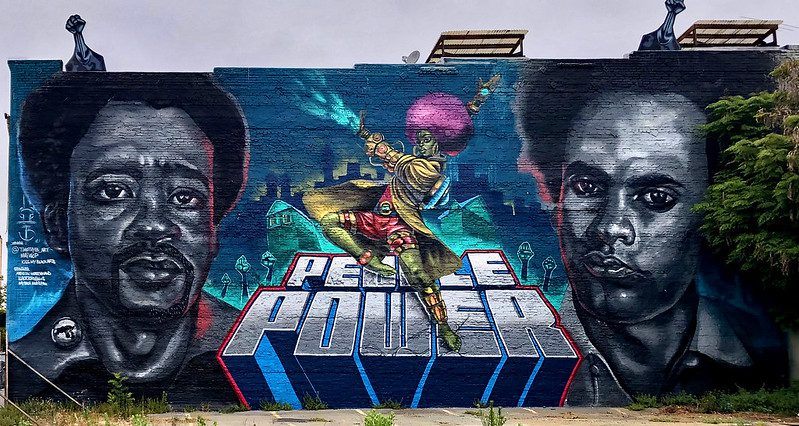#AAIHS2022 Conference Preview: Everyday Practices, Memory Making, and Local Spaces

Later this week the African American Intellectual History Society (AAIHS) will hold its seventh annual conference on March 11-12, 2022, virtually for the second time. The conference is hosted by the University of Nevada, Las Vegas, and was generously supported by many institutions housed upon its campus. The two-day event continues in the AAIHS tradition of offering the most compelling work on African American intellectual history from scholars throughout the world. The theme for this year, Everyday Practices, Memory Making, and Local Spaces encapsulates the important work of AAIHS members who provide historical context to contemporary issues that capture the social, political, and cultural pulse of the United States and beyond.
As we prepare for the first day of the conference on March 11, we want to highlight a selection of panels, roundtables, and special sessions that encapsulate the important work being done by AAIHS scholars in 2022.
The conference begins with a session that highlights different expressions of Black Power, resistance, and “everyday” forms of protest and activism. Of specific interest is the fascinating work of Joshua Crutchfield, an Assistant Editor of the blog Black Perspectives, whose paper contextualizes the recent calls to “defund the police” as an extension of political philosophies developed during the Black Power era. Alongside his fellow panelists, Mickell Carter, Alexis Johnson, and Brian Whetstone, the papers make a necessary intervention into our current understandings of “Black Power and the Freedom Struggle,” and the importance of contextualizing current ideas that may appear novel or radical in public discourse.
Later that day attendees can view presentations that position discussions of race, racism, and memory making into the northern United States, alongside a fascinating panel on “Black Women’s Knowledge Production and Preservation” moderated by Adam McNeil, who currently serves on the AAIHS Executive Board and hosts a popular podcast with the New Books Network.
To conclude the first day’s events, conference attendees will experience an enlightening joint keynote provided by two of the most important scholars in Black Studies and African American intellectual history, Professor Daina Ramey Berry of the University of Texas at Austin, and Professor Kiese Laymon of Rice University. Moderated by Tiffany Florvil, an Associate Professor of History at the University of New Mexico, this keynote session promises to build upon the conference’s broader themes surrounding the intersections of history, memory, and the everyday practices of Black communities, both local and transnational.
Saturday, March 12 will feature a wide array of sessions throughout the day, showcasing a variety of topics discussing Black life in the United States and beyond. Professor Pablo Joseph López Oro of Smith College will moderate an important panel that investigates the international dimensions of racial violence. We are also featuring an important roundtable on “Black Las Vegas” that spotlights local history, comprised of scholars from UNLV and the city of Las Vegas. Collectively, these panelists expose the deep-seeded history of anti-Black racism within a city that many view as a diverse, postracial environment, spotlighting the activists who challenged segregation, redlining, and police brutality throughout Sin City’s 100-year history.
We also feature a variety of “Author Meets Engaged Readers” special sessions, including a dynamic discussion on Abdul Alkalimat’s new book The History of Black Studies, moderated by Amanda Joyce Hall, as well as Tamika Nunley’s award-winning book, At the Threshold of Liberty, moderated by Tyler D. Parry, Vice President of AAIHS and the chair of this year’s conference planning committee.
The final session on March 12 features a Presidential panel on “Memory Making, Resistance, and Identity in Print, Visual and Digital Media,” which will be moderated by AAIHS Secretary Grace D. Gipson, and feature a paper on Black art and commemorative practices from AAIHS President Hettie V. Williams.
Finally, we encourage all registrants to stay for the Awards Ceremony at the end of the conference and celebrate the innovative scholarship being produced by members of AAIHS. We will reveal the winners of AAIHS’s most prestigious awards, including the Pauli Murray Book Prize, the C.L.R. James Research Fellowship, the Maria Stewart Journal Article Prize, and the Du Bois-Wells Graduate Student Paper Prize.
Collectively, the papers and presentations that comprise this seventh annual conference highlight the regional, thematic, and chronological diversity of AAIHS scholars and the important work they do in producing accessible scholarship to the broader public. We look forward to witnessing the dynamic intellectual exchanges at this meeting that will surely foster new approaches toward research, activism, and community building in the future.
Copyright © AAIHS. May not be reprinted without permission.